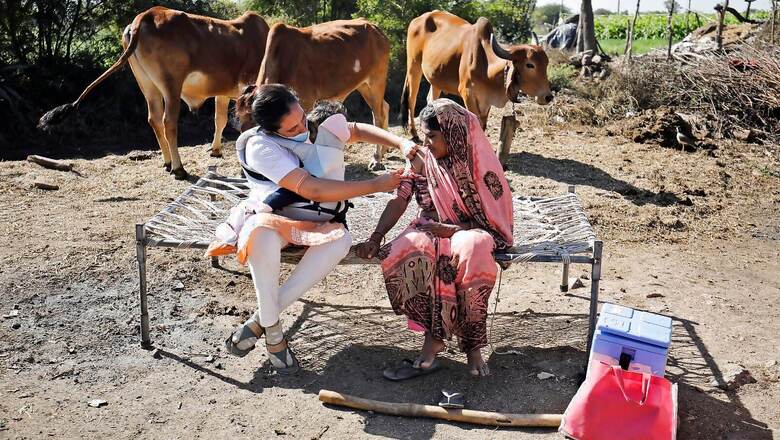
views
Covid-19 vaccines are estimated to have prevented two crore (20 million) deaths worldwide in the first year of the vaccine rollout, a study published in The Lancet said.
It said that the vaccines reduced the potential global death toll during the pandemic by more than half in the year following their implementation.
Claimed as the first modelling study to quantify the impact of Covid-19 vaccines on a global scale, it estimated that 19.8 million (1.98 crore) out of a potential 31.4 million (3.14 crore) deaths were prevented in the first year after vaccines were introduced. The time period taken is from December 8, 2020, to December 8, 2021.
According to the study, which is based on data from 185 countries and territories, high and upper-middle-income countries accounted for the greatest number of prevented deaths, highlighting inequalities in access to vaccines around the world.
It said that a further 599,300 deaths could have been averted if the World Health Organisation’s target of vaccinating 40% of the population in every country by the end of 2021 had been met.
“If the targets set out by the WHO had been achieved, we estimate that roughly 1 in 5 of the estimated lives lost due to Covid-19 in low-income countries could have been prevented,” it said.
It is claimed to be the first study to assess deaths averted directly and indirectly as a result of Covid-19 vaccination, using Covid-19 death records and total excess deaths from each country (or estimates where official data was not available).
“Our findings offer the most complete assessment to date of the remarkable global impact that vaccination has had on the Covid-19 pandemic,” Dr Oliver Watson, lead author of the study, from Imperial College London said.
“Of the almost 20 million deaths estimated to have been prevented in the first year after vaccines were introduced, almost 7.5 million deaths were prevented in countries covered by the COVID-19 Vaccine Access initiative (COVAX).”
Vaccines saved millions of lives
The team of researchers, statisticians and mathematicians found that based on officially recorded Covid-19 deaths, an estimated 18.1 million deaths would have occurred during the study period if vaccinations had not been implemented.
Of these, the model estimates that vaccination has prevented 14.4 million deaths, representing a global reduction of 79%.
These findings do not account for the under-reporting of Covid-19 deaths, which is common in lower-income countries.
Meanwhile, the team did a further analysis based on total excess deaths during the same time period to account for this. They found that Covid-19 vaccination prevented an estimated 19.8 million deaths out of a total of 31.4 million potential deaths that would have occurred without vaccination, a reduction of 63%.
How was the study performed?
Despite the incredible speed of the vaccine roll-out worldwide, more than 3.5 million Covid-19 deaths have been reported since the first vaccine was administered in December 2020.
Several studies have sought to estimate the impact of vaccination on the course of the pandemic. These studies have focused on specific regions, such as individual countries, states, or cities.
However, the latest study is the first to estimate the impact of Covid-19 vaccinations on a global scale and the first to assess the number of deaths averted both directly and indirectly.
To estimate the impact of global vaccination programmes, the press release said, the researchers used an established model of Covid-19 transmission using country-level data for officially recorded Covid-19 deaths. However, China was not included in the analysis owing to its large population and very strict lockdown measures, which (the study said) would have skewed the findings.
“To account for under-reporting of deaths in countries with weaker surveillance systems, they carried out a separate analysis based on the number of excess deaths recorded above those that would have been expected during the same time period.”
Where official data was not available, the team used estimates of all-cause excess mortality. These analyses were compared with an alternative hypothetical scenario in which no vaccines were delivered.
The model accounted for variation in vaccination rates between countries, as well as differences in vaccine efficacy in each country based on the vaccine types known to have been predominately used in those areas.
Read all the Latest News , Breaking News , watch Top Videos and Live TV here.


















Comments
0 comment